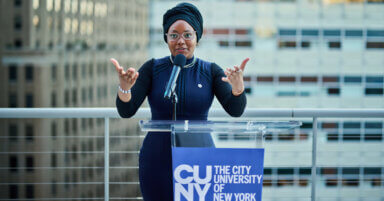Adding ‘Civic Mobility’ to CUNY’s social mobility cred

If there’s one word that defines CUNY’s most fundamental aspiration for its students, it is mobility. The University has long been our city’s greatest driver of upward social and economic movement for New Yorkers of all backgrounds, and in recent years economists have proven it with data: CUNY colleges are the nation’s leaders in propelling people to the middle class.
But there’s another important way in which CUNY’s unique mission can improve lives. I’m calling it “civic mobility.” It’s the idea that a key role played by our universities — particularly a great public university like CUNY — is to shape the next generation of citizens.
The term may sound new, but the concept isn’t. CUNY has been an engine of civic mobility, as well as economic and social mobility, since its founding 175 years ago as the nation’s first free public institution of higher education. Later, Hunter College would become the nation’s largest public college for women and in the 20th century, City College would come to be known as “the Jewish Harvard.” CUNY established groundbreaking research institutes for Puerto Rican and LGBTQI+ studies, among many others, and invited women to join the full-time faculty at a time when such appointments were widely denied. CUNY has a proud history of breaking down barriers; in the process, we produced a long line of pioneering grads who went on to do the same, be it in politics, academia, law or the sciences, and as leading champions of social causes.
Motivated to Make a Difference
Even as we fulfill our primary obligation to provide students with opportunities for academic achievement and career success, it’s also our job to turn out graduates who are well-informed, socially aware and actively engaged with the world. Especially in these times when our society is so polarized, we need to be purposeful about the efforts we make, and the strategies we employ, to equip students with the knowledge, experiences and critical thinking skills they need to have an impact on the lives of others.
The goal of civic mobility is that CUNY graduates are not only prepared to participate in society, but also motivated to make it better. It’s an ideal with a particular obligation to our diverse student population. CUNY has many students who are immigrants or the children of immigrants, and we play an important role in exposing them to the workings of our government and its institutions, and to the power that individual citizens and communities have in American democracy.
The public good also drives CUNY’s growing research enterprise and the missions of our graduate and professional schools — law, medicine, public health and journalism, among others. CUNY Law is the nation’s top public-interest law school. CUNY’s Graduate School of Public Health and Health Policy is driven by a mission to root out inequities in health care. Our School of Medicine is among the nation’s most diverse, and geared to improve the delivery of medical treatment to communities that have long been neglected.
And CUNY’s commitment to deliver on civic mobility continues to produce civic leaders. Three of the four highest ranking City elected officials are CUNY alumni: Mayor Eric Adams (a two-time CUNY graduate), Public Advocate Jumaane Williams (a Brooklyn College grad) and City Council Speaker Adrienne Adams (who started at York College before transferring to Spellman). Nineteen of the 51 City Council members are CUNY grads.
On the state level, Attorney General Letitia James, the first Black woman elected to statewide public office, is a CUNY graduate, as are 28 members of the State Assembly, including Speaker Carl Heastie, and 10 state senators, including Majority Leader Andrea Stewart-Cousins.
Countless CUNY graduates are activists and leaders of civic organizations. People like Melva Miller, CEO of the Association for a Better New York. She holds three CUNY degrees and is working on a fourth — a Ph.D. at the CUNY Graduate Center.
For these leaders, as they often proudly share, CUNY campuses were incubators of their public service aspirations. They found opportunities that opened doors, and teachers and mentors who encouraged them. Now they are role models for a new generation of CUNY students. In recent years, CUNY has developed and expanded programs that put our students at the center of the University’s civic commitment.
The CUNY Votes initiative has promoted election awareness throughout the city and registered thousands of new voters. CUNY Citizenship Now! is the country’s largest University-based free legal service for immigrants. The CUNY Service Corps personifies CUNY’s history of service to the city, offering students work experiences in community-based organizations and government agencies. Thousands of students have mobilized for CUNY campaigns to promote COVID vaccination and Census participation.
Activities like these are deeply embedded in our university’s history, culture and legacy of social justice. And now we have found a name for it. Through our commitment to “civic mobility,” we will continue to develop ways for CUNY students to actively engage with the world outside their classrooms and to be motivated to improve the world.
Matos Rodríguez is the chancellor of The City University of New York (CUNY), the largest urban public university system in the United States.




